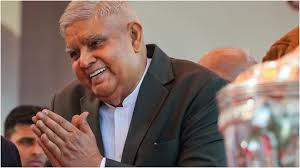Today in Politics: Parliament after Dhankar’s resignation; Revanth Reddy in Delhi

The political landscape in India witnessed significant developments today, marking a period of transition and strategic positioning. The resignation of Vice President Jagdeep Dhankhar sent ripples through the corridors of power just as the Monsoon Session of Parliament began, while Telangana Chief Minister A. Revanth Reddy’s visit to Delhi signaled a renewed push for greater representation and social justice for backward classes in his state.
A Sudden Resignation: Dhankhar’s Exit from Vice Presidency
On July 21, Jagdeep Dhankhar, the Vice President of India, officially tendered his resignation, citing health reasons. The announcement took the political ecosystem by surprise, as it came on the very first day of the Monsoon Session of Parliament — a session crucial for legislative business and government accountability.
Dhankhar’s tenure as Vice President was marked by a robust presence in the Rajya Sabha, where he functioned as the Chairperson, overseeing debates and ensuring smooth legislative processes. His resignation thus left an immediate vacuum in a key constitutional position, sparking questions from political parties and observers alike.
Government sources clarified that Dhankhar’s departure was amicable and respected. Rumors suggesting any abrupt eviction from the Vice President’s official residence were swiftly denied by the administration, emphasizing a dignified and orderly transition. The Election Commission promptly initiated the process to elect a new Vice President, with the election schedule to be announced shortly.
However, opposition parties have not let the matter rest quietly. Several leaders demanded transparency on the underlying reasons behind Dhankhar’s resignation, suggesting that health might have been a convenient explanation for what could be deeper political considerations. The Congress party, in particular, has called for a thorough probe and an open dialogue, underscoring the importance of preserving the dignity and sanctity of constitutional offices.
This episode also opened a broader conversation about the current government’s approach to key appointments and the subtle undercurrents shaping political alignments. The Vice Presidency, though largely ceremonial, holds significant sway in Parliament and national affairs. The selection of the next occupant is being keenly watched as a barometer of the government’s political strategy in the run-up to general elections.
Revanth Reddy’s Strategic Delhi Visit: Amplifying Telangana’s Voice
In the backdrop of the Vice President’s resignation, Telangana Chief Minister A. Revanth Reddy arrived in the national capital for a crucial two-day visit. His agenda focused on securing greater political representation for his state, particularly advocating for the appointment of an OBC (Other Backward Classes) leader as the next Vice President.
Revanth Reddy has championed the candidature of Bandaru Dattatreya, a prominent Telugu OBC leader, former Union Minister, and ex-Governor, for the Vice Presidency. This move reflects Telangana’s ongoing efforts to assert the political clout of backward classes, which form a substantial part of the state’s population. Reddy’s advocacy also underscores the increasing emphasis on social justice and equitable representation in India’s higher echelons of power.
Beyond the Vice President’s election, Revanth Reddy is presenting Telangana’s caste survey model to Congress MPs in Delhi. The survey aims to provide comprehensive data on the demographic composition of backward classes in Telangana, serving as the basis for a proposed 42% reservation for backward classes in local body elections.
This push for reservation expansion is part of a broader socio-political campaign led by Reddy to strengthen the rights and opportunities for marginalized communities within the state. It is also a strategic attempt to consolidate the backward class vote bank ahead of future elections, positioning Telangana as a leader in progressive social policy.
The Congress leadership in Delhi has received Revanth Reddy’s proposals with interest, and deliberations are underway to find common ground. The support from national leaders is seen as vital for the successful implementation of these measures, given the constitutional and political complexities involved in reservation policies.
Political Implications and Outlook
The resignation of a sitting Vice President is a rare and significant event, especially when it coincides with an active parliamentary session. It places the government in a position to swiftly manage the transition while maintaining political stability. The choice of the next Vice President is therefore a matter of intense political calculation, as it can signal shifts in alliances and power balances.
Revanth Reddy’s assertive move to lobby for an OBC candidate and push for expanded backward class reservations reflects the growing political assertion of historically underrepresented communities in India. It also highlights the importance of Telangana as a key player in national politics, balancing regional aspirations with national ambitions.
Together, these developments underscore the dynamic nature of Indian politics, where constitutional changes, electoral strategies, and social justice agendas intersect. The coming weeks will likely see intensified negotiations and political maneuvering as parties seek to position themselves advantageously for upcoming elections and policy debates.
In Conclusion
Today’s political developments paint a picture of transition and assertiveness. The Parliament grapples with the sudden resignation of its Vice President, a key constitutional figure, while Telangana’s Chief Minister Revanth Reddy undertakes a mission to secure more significant representation for backward classes and his state.
As the nation watches, the upcoming Vice Presidential election and the debate over caste-based reservations will be critical touchpoints shaping India’s political and social future. The interplay of constitutional mandates, political strategies, and grassroots demands will define the next chapter of governance and representation.






